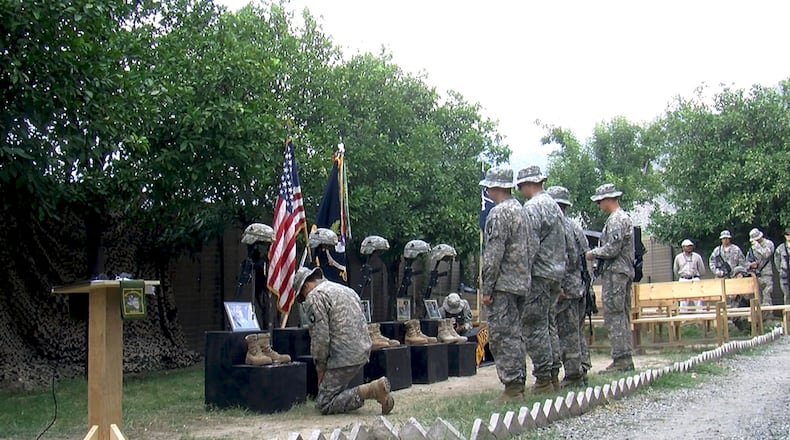Army Chaplain Justin David Roberts did not carry a weapon into war. He carried a camera.
He was in the heat of action, barely behind the lines, while serving in Afghanistan with the U.S. Army battalion’s “No Slack” battalion in Afghanistan. The band of brothers (official designation: 2nd Battalion, 327th Infantry Regiment, 1st Brigade Combat Team, 101st Airborne Division out of Fort Campbell, Ky.) are some of the toughest guys you’ve ever seen. One soldier gets shot in the hand, so he just uses the other until the smoke clears. Another gets shot in the head and suffers a broken back and other serious injuries. After multiple surgeries and a few months of recovery, he demands to return.
“Some of my friends were willing to die for one another,” Roberts said during an interview. “Some of them did die for one another.”
"No Greater Love," the documentary he produced from his war footage and extensive interviews with the soldiers upon their return, is in limited release now. (For locations and other information and to view the trailer, see nogreaterlovemovie.com.) Its title comes from Scripture: "Greater love hath no man than this, that a man lay down his life for his friends," reads John 15:13.
Here's the trailer:
A Texas native whose grandfather was a veteran, Roberts is hoping the release, coinciding with Veterans Day, will help civilians appreciate the struggles military personnel face in the field and back home. Sometimes, dealing with the return from war rivals combat itself.
A few welcome-home anecdotes soldiers discuss in “No Greater Love” are funny. Next time you’re in the mall, note how slowly the average shopper lopes around. Or listen up for people in the coffee shop griping that their lattes taking too long. Stuff like that drives soldiers up the wall.
But much more often, those in combat bring serious psychological turmoil home with them, to sometimes devastating effect.
“As far as transitioning to civilian life, it’s definitely a long journey,” said Roberts, whose own re-entry challenges informed his work on the film. “Right now we have more than 20 suicides a day. This is the no. 1 killer of our service members. Not North Korea, not the Taliban. There’s a quiet epidemic that’s going on.”
According to an extensive nationwide report compiled by the U.S. Department of Veterans Affairs’ Office of Mental Health and Suicide Prevention in 2014, “the risk for suicide was 22 percent higher among veterans when compared to U.S. civilian adults.” Veterans made up about 8.5 percent of the U.S. population that year, but represented 18 percent of deaths by suicide.
“I want people to understand what’s happening with our military and with our veterans,” Roberts said.
His approach has been to encourage the guys he served with to get together, share their feelings and seek help when necessary. A number of the soldiers interviewed in his film tear up and even cry freely on camera. One cringes as he recalls his young daughter’s alarm when he yells, unaware he’s shouting. Another laments his divorce. They all grieve those who didn’t make it home.
Roberts was able to get his friends to unpack their emotional rucksacks by putting in the time.
“We focused on just connecting,” he said.
Aware that many Americans want to honor Veterans Day with action, he Roberts has links to organizations that serve veterans posted on his movie’s site.
“The second you start engaging in conversations people who are going through these circumstances you see what the needs are,” he said. “If you’re part of a church, support a veterans ministry. Adopt a veterans organization by donating time or supporting the cause. Gratitude is amazing, but actions are more powerful.”
Credit: Jennifer Brett
Credit: Jennifer Brett
About the Author
Keep Reading
The Latest
Featured




